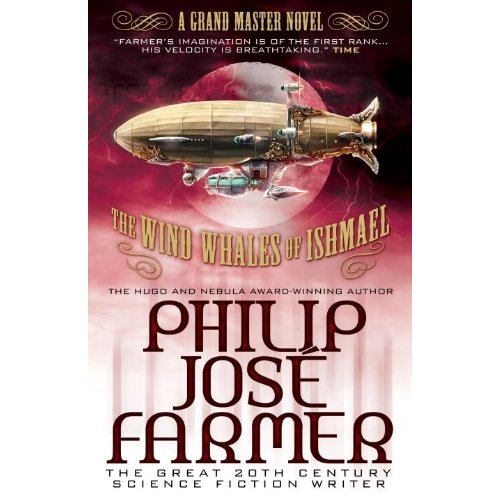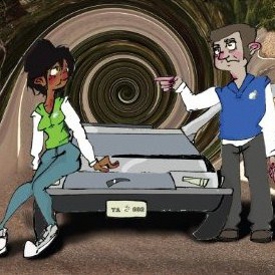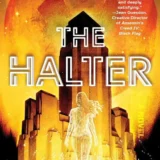 I have two purposes for this review. One is to call your attention to a novel that older readers have probably already read, The Wind Whales of Ishmael by Philip José Farmer (originally published by Ace Science Fiction in 1971) now released by British publishers Titan Books. My second purpose is to call your attention to Titan Books themselves.
I have two purposes for this review. One is to call your attention to a novel that older readers have probably already read, The Wind Whales of Ishmael by Philip José Farmer (originally published by Ace Science Fiction in 1971) now released by British publishers Titan Books. My second purpose is to call your attention to Titan Books themselves.
Titan Books has taken on the task of reprinting, with new introductions, the sidestream works of Philip José Farmer, in this case his works involving his favorite literary figures–Ishmael from Moby Dick, Phileas Fogg from Around the World in Eighty Days, and of course Doc Savage (The Mad Goblini) and Tarzan (The Lord of the Trees). Farmer, like Bradbury, was ever conscious of his literary forbears and it only seems natural that they’d “bleed” over into his own writing. So while he was constructing his major works (Riverworld, the World of Tiers, and his other classic novels), his enthusiasm for his fictive ancestors show up in Burroughs-like adventure stories. The first of these was The Wind Whales of Ishmael.
Edgar Rice Burroughs, of course, is Farmer’s creative template. As a child, Burroughs was Farmer’s greatest influence. What impressed Farmer most in Burroughs was the Lost World novel and Farmer’s best work has to do with human protagonists exploring lost worlds of Farmer’s creation (Riverworld is the best of them, of course). Farmer, though, wasn’t happy with writing about his own characters. He took on those of other authors–and quite successfully. This is now, as you know, a common enough literary conceit in fantasy and science fiction as well as graphic novels. The League of Extraordinary Gentlemen is a good example of this. But we have Sherlock Holmes and Sigmund Freud teaming up. Captain Nemo and Jules Verne–you name it. But it all started with Philip José Farmer.
The Wind Whales of Ishmael picks up at the end of Moby Dick. The lone survivor of the ill-fated Pequod is whisked away to a future earth filled with wind-whales and an equally strange whaling culture rife with all kinds of dangers that you’d find on Burroughs’ Mars or down in Pellucidar. It’s a short novel and Farmer doesn’t wear out his welcome as he works through this conceit of his.
What’s of more importance, however, is the mere fact that Titan Books in England (and not an American publisher) is bringing Farmer’s other publications back into print, all of which I can heartily recommend. Titan Books has gone to great care to give all of these works a “steampunk” look and this includes other works in the same vein by James P. Blaylock and Kevin Anderson. The artwork is fantastic and a great deal of care has gone into these reissues. As American publishers are going through agonizing changes, other publishers are taking up some of the slack. I recommend that you track down some of these books. Their website is www.titanbooks.com and I’m sure they’d love to have you drop in.










Don't forget Farmer's literray homage to Kurt Vonnegut, writing a "Kilgore Trout" novel VENUS ON THE HALFSHELL.
Loved the Riverworld books and just read A Feast Unknown. Will need to pick this up. BTW, Titan has been reprinting some great books, especially Newman's Anno Dracula series.
Well done Im a big Farmer fan and its time to reread this one a true farmer classic
Thanks for the pointer. I haven't read Farmer for decades and this is a great opportunity to get back into his work.
Thank you, Mr. Cook, for the lead on the new Titan reprints. Having read Howard, Leiber and Carter as a boy, P.J. Farmer lead me to Burroughs, Doyle, Ellison, Asimov, Bradbury, Bester, Dick and other great writers. TV's "Star Trek" didn't impress me, nor "Star Wars" as I'd read The Lensman series and tales of "Slippery Jim", Buck and Flash. I wonder how 2013 me will enjoy what 1970's me first read.
Again, you have my thanks.